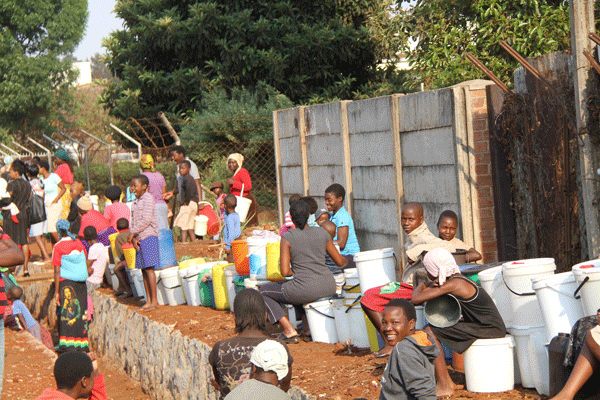
Harare City Council says it is limiting running water to two days a week due to a drier-than-normal rainy season as criticism mounted over the move.
The aim of water-rationing is to help distribute water equally among Harare residents, said Mike Chideme, the council spokesman.
“We did not receive enough rain water this season,” Chideme said.
“That has also negatively affected our capacity to deliver water to the people, so this is a natural cause. Some of our supply dams and water levels are low, and the water is heavily polluted.
“The water demand management programme will actually improve on the health of the people in Harare in that we will equitably distribute the resource that is available, unlike in a situation where some areas go dry 24/7.
“But this time around, all areas will have a fair share of water available.”
However, the plan has sparked fears of water-borne diseases such as cholera and typhoid in the city as people turn to unprotected water sources.
Benedict Mupokosa (68), who is from Budiriro, the epicentre of last year’s cholera outbreak, said water shortages happen far too often.
- Chamisa under fire over US$120K donation
- Mavhunga puts DeMbare into Chibuku quarterfinals
- Pension funds bet on Cabora Bassa oilfields
- Councils defy govt fire tender directive
Keep Reading
Each day, he fetches over 100 litres of water from a nearby borehole that was drilled last year by an international aid organisation.
He fears the worst with the two-day water supply plan.
“Why when we have got water in the lake and it’s not getting to the people? Why?” Mupokosa queried.
“They have to give reasons. It’s bad because cholera is next door [near unhygienic conditions].
“It can come back anytime because people without proper sanitation will definitely be affected by cholera. That’s bad.”
Hardlife Mudzingwa of Community Water Alliance, an advocate for the provision of safe, clean water in Zimbabwe, said he feared more and more people would turn to unprotected water sources.
The group argues the government should ensure alternative water supplies are safe.
“The human right to water has been greatly infringed,” Mudzingwa said.
“EMA [Environmental Management Agency] produced a report for 2018 and 2017 that condemned many of the boreholes, in terms of the quality of that water.
“So, the local authority should’ve ensured that there is treatment at the point of use so that people, when they look for other alternative water sources, they get at least safe water, and the human right to water is actually respected.”
Council insists it has mechanisms to ensure that its water-rationing programme will not harm people’s health, that water will be equitably distributed and that some areas will not go dry for days.
But Mupokosa and other Harare residents are not convinced that drought is causing the water shortages.
Mupokosa sees mismanagement as the reason he has to collect water half a kilometre from his home every day.
— VOA











